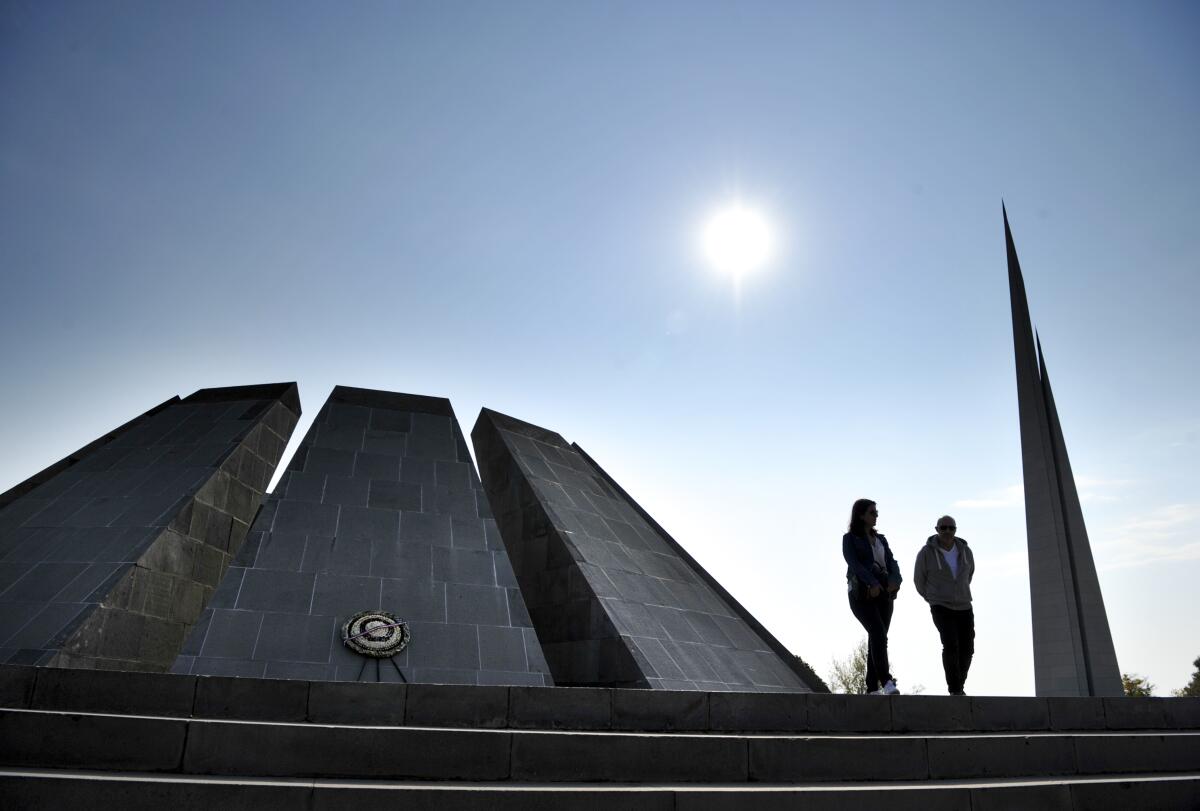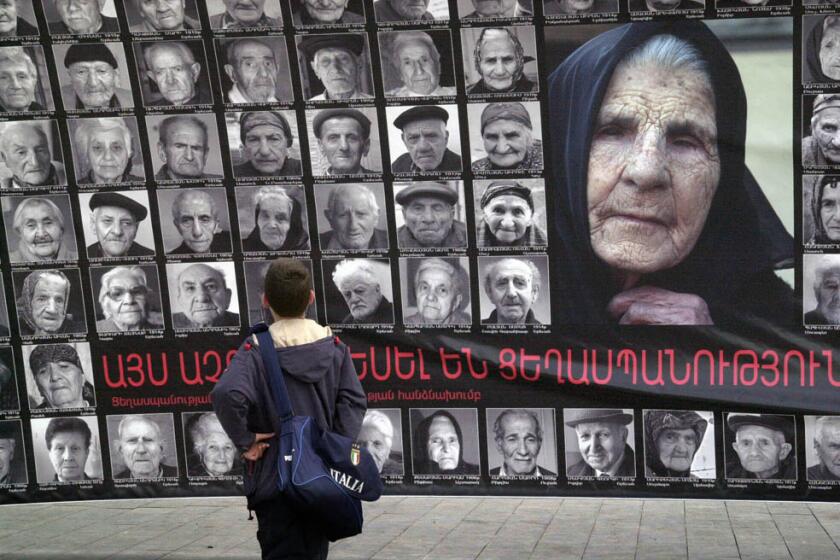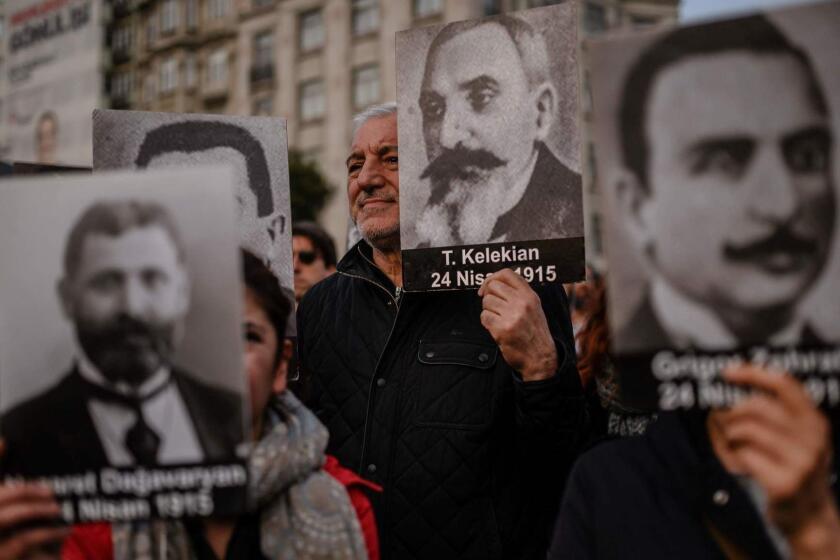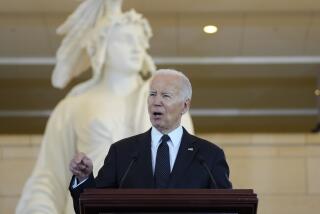What’s behind Armenians’ long battle to secure a U.S. designation of genocide?

- Share via
WASHINGTON — April 24 is a day of profound sorrow for ethnic Armenians everywhere, marking the date in 1915 when officials of the Ottoman Empire, the forerunner of present-day Turkey, rounded up and killed hundreds of Armenian community leaders in what is now Istanbul, then called Constantinople. That began a cascade of catastrophic events that left more than a million Armenians dead.
This far-reaching yet deeply intimate trauma has echoed down through the generations, including in the large Armenian diaspora in Southern California. As is done every year, Saturday will be solemnly observed in Armenia and by the diaspora around the world as Armenian Genocide Remembrance Day.
This year’s commemoration, though, marks a historic first, one accompanied by an American president formally placing that crucial designation — genocide — on the mass atrocities systematically committed by Ottoman Turks against the Armenian people.
Other countries such as Italy and Germany, which is home to a large ethnic Turkish population, have adopted that terminology in recent years, incensing Turkey, a NATO ally. The U.S. had demurred until now, with President Biden taking the step that the Armenian community and many backers in Congress consider painfully overdue.
Here is a look at a long-simmering issue and what a change in the official U.S. stance could mean.
What is genocide, and how is the word used in an international context?
It was not until 1946 that genocide — a term cobbled together from the Greek genos, meaning race or tribe, and the Latin cide, for killing — was recognized by the United Nations General Assembly as a crime under international law, galvanized by the Nazis’ infliction of the Holocaust on the Jewish people. Codified by U.N. convention two years later, genocide is somewhat narrowly defined in international law, but its main elements revolve around the intent to wipe out a particular group of people based on national, ethnic, racial or religious identity.
Scholars are building a record of memories from the Armenian diaspora that chronicle an often untold perspective on life under the Ottoman Empire.
Armenians have campaigned for decades to have the designation applied to the slaughter that commenced 106 years ago. Over the years, growing numbers of historians have lent their support to the designation, and dozens of countries have accepted the Armenian genocide as rooted in historical fact.
Biden, by carrying through on a campaign pledge to recognize the genocide, casting it as part of the White House’s overall emphasis on the importance of human rights worldwide, made his administration the 30th government to do so.
Congress passed a nonbinding resolution in 2019 recognizing the Armenian genocide.
What is Turkey’s stance on the genocide designation?
Vehement objection. Turkey acknowledges widespread deaths in what it calls fighting between Ottomans, who were mainly Muslims, and Armenians, largely Christian, but contends that the acts did not constitute a genocide in intent. Turkey argues that many of the deaths were due to hunger and disease during a forced mass exodus as World War I was erupting and the Ottoman Empire disintegrating, not the direct result of lethal force by Ottoman troops. The Turkish government also contests the Armenian death count commonly cited by historians, an estimated 1.5 million.
As reports circulated this week that Biden was expected to formalize the designation, Turkey voiced angry new protests. In a statement released Thursday, President Recep Tayyip Erdogan said Turkey would fight on against “the so-called Armenian genocide lie” and those who “support this slander based on political calculations.”
How might a genocide designation by Biden affect U.S.-Turkish ties?
Even in this early phase, the Erdogan-Biden relationship is far cooler than the one the Turkish leader enjoyed with former President Trump. On the issue of genocide, Trump, like other U.S. presidents before him, was reluctant to jeopardize ties with Turkey, which has been an often-recalcitrant but important U.S. partner in the Middle East, especially during the decade-long war in Syria.
But there have long been serious strains in the bilateral relationship, some stemming from Erdogan’s harshly authoritarian measures after an attempted coup in 2016. The Turkish government remains angry over the U.S. providing a haven to aging cleric Fethullah Gulen, accused by Erdogan of fomenting the coup attempt, and the Turkish leader caused consternation in Washington with the purchase of a Russian S-400 missile-defense system, viewed by the Pentagon as a threat to NATO security. The deal resulted in U.S. sanctions against Ankara.
Turkish President Recep Tayyip Erdogan is challenging nations who label the mass killings of Armenians by Ottoman Turks as genocide, saying they should inspect Turkey’s Ottoman-era archives and “we have nothing to hide.”
European allies also reacted with dismay when Erdogan, in March, annulled Turkey’s ratification of a Council of Europe treaty on violence against women. That move reignited Western disapproval over the plight of women in a conservative society in which gender-based violence is rampant and female equality remains a distant prospect.
While a formal U.S. recognition of the Armenian genocide is largely symbolic, Turkey could potentially make its displeasure clear by hampering American naval access to the Black Sea via the Bosporus, or complicating U.S. operations at Turkey’s sprawling Incirlik air base.
In preparation for this statement Saturday, Biden spoke to Erdogan on Friday, and the White House said he expressed “his interest in a constructive bilateral relationship with expanded areas of cooperation and effective management of disagreements.”
Before his election, Biden said he would make the genocide designation — but some previous U.S. leaders said the same as candidates, and then backed down once in office.
Start your day right
Sign up for Essential California for the L.A. Times biggest news, features and recommendations in your inbox six days a week.
You may occasionally receive promotional content from the Los Angeles Times.
On Thursday, State Department spokesman Ned Price acknowledged the possibility of a Turkish backlash against a U.S. declaration. “As friends, as allies, when we have disagreements, we raise those. We discuss those,” he said. “And there’s no papering over them.”
Biden has been under particular pressure from some prominent lawmakers from his own party, including Rep. Adam B. Schiff (D-Burbank), who has long championed the Armenians’ cause. Schiff and others point to the poignancy of the fact that, like the Holocaust, the Armenian genocide fades a bit more from direct living memory as fewer people every year remain alive who experienced the horrific events or their near-term aftermath.
Times staff writer Tracy Wilkinson in Washington contributed to this report.
More to Read
Sign up for Essential California
The most important California stories and recommendations in your inbox every morning.
You may occasionally receive promotional content from the Los Angeles Times.












